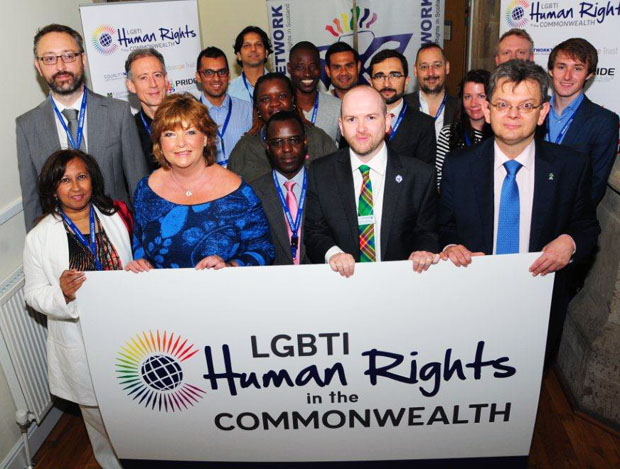LGBTI conference declaration
Published: 23 July 2014
The LGBTI Human Rights in the Commonwealth conference took place on Nelson Mandela International Day and passed a ground-breaking statement which activists plan to use to lobby the Commonwealth.
The LGBTI Human Rights in the Commonwealth conference took place on Nelson Mandela International Day, 18 July, and passed a groundbreaking Statement which activists plan to use to lobby the Commonwealth.
Over 150 human rights activists including speakers from around the world came together in Sir Charles Wilson Building to call for the Commonwealth to respect the human rights of lesbian, gay, bisexual, transgender and intersex (LGBTI) people. The conference was organised to highlight the discriminatory environment faced by LGBTI people in Commonwealth states. Of the 53 Commonwealth states, 42 have laws that criminalise same-sex sexual behaviour.
Dr. Matthew Waites represented Glasgow Human Rights Network on the conference steering group, and took a leading role in drafting the Statement - presenting it in the final plenary session where it was approved with only one vote in dissent. Support for the Statement was wide-ranging, from African, Indian and Caribbean speakers and also from UK activists including Kaleidoscope and Peter Tatchell.

The Statement passed condemns the Commonwealth’s record on LGBTI rights and calls for concrete action to improve the lives of LGBTI people. It calls on the Commonwealth to take seriously the many violations of the rights of LGBTI people and to work with member states to end the criminalisation and persecution of LGBTI people.
Organised by the Equality Network, the Kaleidoscope Trust, the Glasgow Human Rights Network and Pride Glasgow, keynote speakers included Fiona Hyslop MSP, Scottish Government Cabinet Secretary for Culture and External Affairs, Dr Frank Mugisha, Executive Director of Sexual Minorities Uganda, Dr Purna Sen, former Head of Human Rights at the Commonwealth Secretariat and Chair of the Kaleidoscope Trust. The Maltese Government, hosts of the next Commonwealth Heads of Government Meeting in 2015, were represented by Silvan Agius.
Dr. Matthew Waites of Glasgow Human Rights Network commented; “This is a groundbreaking Statement, fittingly passed on Mandela Day. Crucially the Call to Action first recognises that it was British colonial laws that criminalised same-sex sexual behaviour around the world. The Statement takes a multi-dimensional approach to human rights, affirming LGBTI rights in relation to all forms of civil, political, social, economic and cultural rights. We’re delighted that the Statement was supported by activists from many regions of the Commonwealth and offers important guidance, as we head toward the next Commonwealth Heads of Government Meeting in Malta next year.”
Monica Tabengwa, Human Rights Watch activist from Botswana said; “It is unfortunate that the Commonwealth is so silent and non-committal on LGBTI human rights issues affecting members of the Commonwealth family. It is time now for this institution to get involved and come up with effective measures and guidelines for holding countries responsible for human rights violations based on sexual orientation, gender identity or expression. Commonwealth institutions have to commit resources to work with partners and friendly countries to counter the alien legacy of criminalisation.”
Bisi Alimi, LGBTI activist from Nigeria, said; “As the eyes of the world are focused on Commonwealth countries as athletes converge in Glasgow, it is important to align with LGBTI people of the Commonwealth. LGBTI people have had to bear the burden of not just colonial laws discriminating against many of them, but in the case of Nigeria, yet further criminalisation. This is why along with many other LGBTI people of the Commonwealth, I am calling for the end to hate, stigma and discrimination"
University Principal Anton Muscatelli, who greeted the Cabinet Secretary and was introduced by Dr. Waites to Peter Tatchell, commented: 'Equality and respect for diversity is a core driver for the University of Glasgow. I'm delighted at the role which my colleagues in the University and the Human Rights Network have played in organising a highly successful LGBTI Human Rights in the Commonwealth Conference. I fully endorse the statement which the Conference has adopted.'
Scott Cuthbertson, Community Development Coordinator for the Equality Network, said; “We are very grateful to colleagues from all around the Commonwealth who came to the conference in Glasgow to share their experiences and draw up this Call to Action. This is an issue that needs attention, and we commend the call to action to the Commonwealth and its members. We hope that the Scottish and UK Governments will give their support to taking this work forward.” Full details of the conference and a link to the statement can be found on the Glasgow Human Rights Network website.
First published: 23 July 2014
<< August

